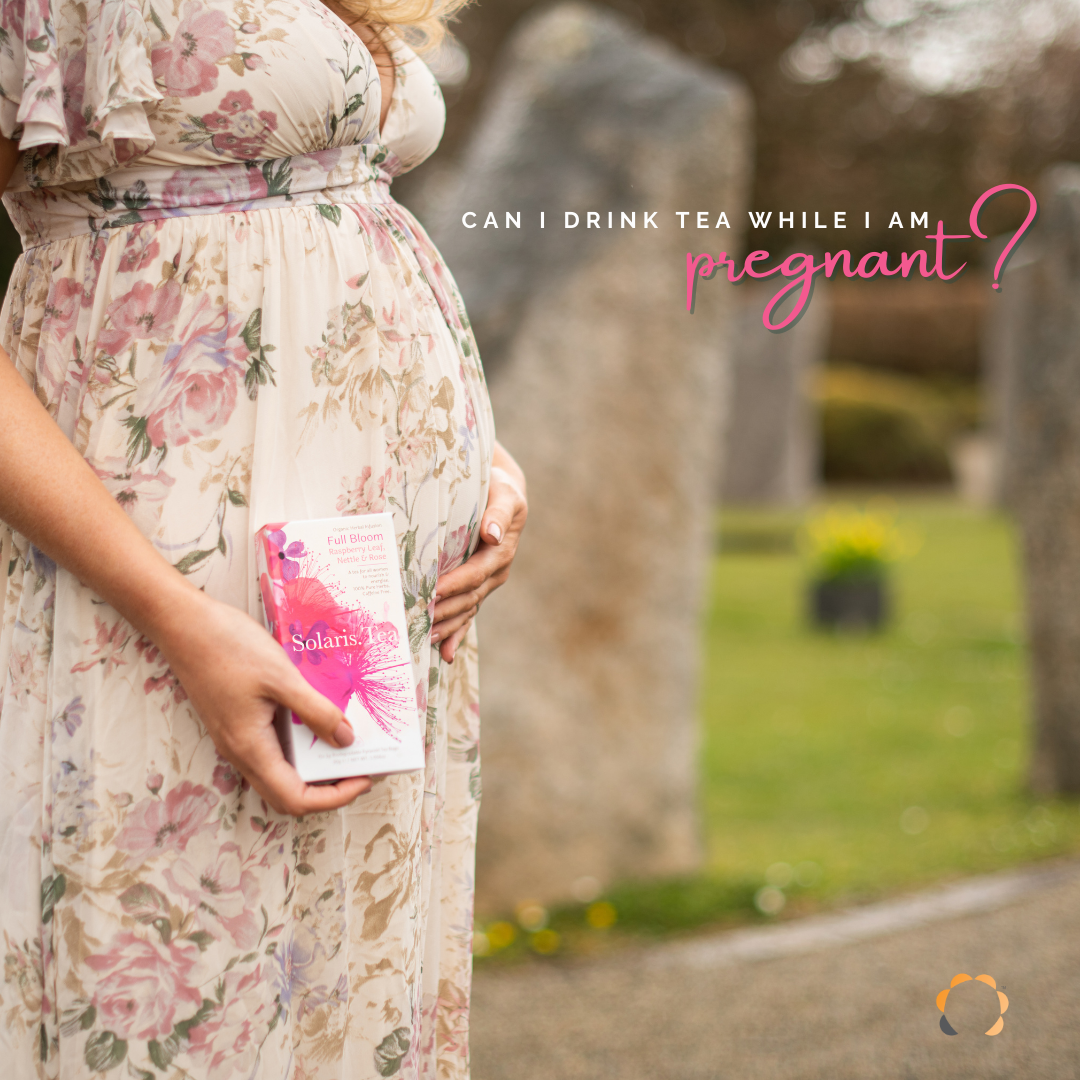Pregnancy Tea? Learn a bit more about it!
From the moment a woman finds out that she is pregnant, she instinctively pays much more attention to the foods she consumes, medicines she takes and anything we put into or onto our body.
Our sense of smell and taste becomes heightened, and our instincts are tuned to protect ourselves and our babies.
As such our own bodies become and always are our best guide to let us know what’s good for us or not!
The one thing I tell women and their partners again and again when it comes to their bs h and their changing bodies - Trust yourself! You’re generally right even if you can’t put your finger on it.
For this reason, many pregnant women turn to body care products during pregnancy that are free from colours, artificial perfumes and chemicals. Similarly, we are often conscious to eat fresh unprocessed foods and use gentle natural remedies when treating minor health complaints.
Even here it is important to note that especially in the first three months of pregnancy when many of the major organs of the baby are forming and the placenta is growing healthy and strong, use any medicines or supplements, whether conventional or herbal with caution.
Thankfully there are many that are perfectly safe to take, but if in doubt check in with your registered Herbalist, GP or Midwife to make sure.
Natural does not always equate to safe, and some components found in plants have powerful actions, which means they behave like medicines.
Saying that, it is important to say that in the field of herbal medicine, most water based herbal ‘teas’ or infusions, are among the safest remedies in the nine months of pregnancy.
Due to its polyphenol content, tea is beneficial for a pregnant woman's body since they play a key role in the prevention of cardiovascular diseases, diabetes and even obesity, while also acting as anti-inflammatory substances in certain processes.
Drinking a cup of relevant herbal tea first thing in the morning can help you to improve your day by relaxing your body and calming your mind. In addition. Herbal infusions can be an alternative to drinking water, which will help maintain adequate hydration and at the same time provide nutrients that will be easily absorbed by the body.
We will discuss below some herbs that are generally considered safe for pregnant women, but we recommend talking to your herbalist, doctor or midwife before taking them if you have any concerns to their suitability for you personally.
Herbal Infusions suitable for pregnant women and their benefits
Thyme tea
One of the best infusions during pregnancy is thyme tea. Because of its ability to relieve nasal congestion, this tea is very suitable for women with flu or sinusitis who cannot take medication.
Peppermint tea
To avoid motion sickness during the first trimester of pregnancy, it is recommended to drink mint tea, which helps reduce symptoms and restore appetite.It is also great for headaches.
Check out our selection of tailored herbal teas by Solaris for pregnancy:
Fresh Bloom

The hormonal and physical changes and even anxieties linked to the 2nd and third trimester of pregnancy can make sleeping something to only dream off!
Our Fresh Bloom Tea is a light and floral infusion with sweet, honey-like notes and a bright golden hue. It combines calming Chamomile, Rose and Lime Flower with soothing Oat Straw and Fennel. Deeply soothing and calming, this tea is ‘A Hug in a Cup’ for all the family, and it’s safe for drinking during pregnancy and breastfeeding.
Full Bloom

A nourishing and balancing tea for the Third Trimester ‘Full Bloom’ is a vibrant, green infusion with a light fruity flavour and floral top notes. Combining nourishing Raspberry Leaf and earthy Nettle, this tea uplifts and calms with Chamomile, Rose and Lemon Balm.
Raspberry leaves have a long history of use in many traditions. Nettles or ‘Néantog’ abound in Irish folklore for nourishing and replenishing.
How about Black/Green Tea?
Can I drink tea with theine if I am pregnant?
Although theine-containing teas are not prohibited, as with coffee, it is advisable not to overdo it. Some teas can interfere with the absorption of iron and calcium, increasing the risk of anaemia when consumed in excess.
Green tea is safe to consume. Antioxidants in this tea help protect DNA and promote a healthy baby's development. White tea and Jasmine tea are also safe to drink during your pregnancy.
On the other hand, red tea, black tea, and mate tea should be avoided.
Some guidelines about teas and infusions during pregnancy
- Infusions should not be drunk more than twice a day. Some experts recommend limiting the number of cups per week to 4 to 5.
- Prefer teas without theine.
- Prefer organic teas
- Avoid any side effects by drinking different types of tea rather than always the same one.
- Discard teas that have properties that stimulate the uterus, for example aniseed, rosemary, pennyroyal and nettle.
- Before mixing different herbs, check their composition and consult a medical herbalist if in doubt.
Teas that should be avoided during pregnancy
Theine or stimulating teas should not be consumed during pregnancy along with those whose composition may release harmful or toxic substances for the baby.
Some teas and herbs to avoid during pregnancy are:
- Aloe vera
- Dandelion
- Artemisia
- Marigold
- Ginseng
- Wormwood (avoid also during breastfeeding)
- Eucalyptus
- Gingko biloba (also avoid while breastfeeding)
 |
Karin Müller is co-owner of Solaris tea and has been working in the field of wellness and health for over 20 years now. She is a Medical Herbalist (BSc Hons), practising Midwife (BSc Hons), Massage and Spa therapist and experienced course facilitator and teacher on a wide range of topics related to mindfulness, meditation and women’s health. She is currently also studying in the ‘Medicine of Light’ school to deepen her spiritual practise. |
𝘈𝘭𝘭 𝘤𝘰𝘯𝘵𝘦𝘯𝘵 𝘧𝘰𝘶𝘯𝘥 𝘰𝘯 𝘵𝘩𝘦 𝘚𝘰𝘭𝘢𝘳𝘪𝘴 𝘵𝘦𝘢 𝘸𝘦𝘣𝘴𝘪𝘵𝘦 𝘢𝘯𝘥 𝘴𝘰𝘤𝘪𝘢𝘭 𝘮𝘦𝘥𝘪𝘢, 𝘪𝘯𝘤𝘭𝘶𝘥𝘪𝘯𝘨: 𝘵𝘦𝘹𝘵, 𝘪𝘮𝘢𝘨𝘦𝘴, 𝘢𝘶𝘥𝘪𝘰, 𝘰𝘳 𝘰𝘵𝘩𝘦𝘳 𝘧𝘰𝘳𝘮𝘢𝘵𝘴 𝘸𝘦𝘳𝘦 𝘤𝘳𝘦𝘢𝘵𝘦𝘥 𝘧𝘰𝘳 𝘪𝘯𝘧𝘰𝘳𝘮𝘢𝘵𝘪𝘰𝘯𝘢𝘭 𝘱𝘶𝘳𝘱𝘰𝘴𝘦𝘴 𝘰𝘯𝘭𝘺. 𝘛𝘩𝘦 𝘊𝘰𝘯𝘵𝘦𝘯𝘵 𝘪𝘴 𝘯𝘰𝘵 𝘪𝘯𝘵𝘦𝘯𝘥𝘦𝘥 𝘵𝘰 𝘣𝘦 𝘢 𝘴𝘶𝘣𝘴𝘵𝘪𝘵𝘶𝘵𝘦 𝘧𝘰𝘳 𝘱𝘳𝘰𝘧𝘦𝘴𝘴𝘪𝘰𝘯𝘢𝘭 𝘮𝘦𝘥𝘪𝘤𝘢𝘭 𝘢𝘥𝘷𝘪𝘤𝘦, 𝘥𝘪𝘢𝘨𝘯𝘰𝘴𝘪𝘴, 𝘰𝘳 𝘵𝘳𝘦𝘢𝘵𝘮𝘦𝘯𝘵. 𝘈𝘭𝘸𝘢𝘺𝘴 𝘴𝘦𝘦𝘬 𝘵𝘩𝘦 𝘢𝘥𝘷𝘪𝘤𝘦 𝘰𝘧 𝘺𝘰𝘶𝘳 𝘱𝘩𝘺𝘴𝘪𝘤𝘪𝘢𝘯 𝘰𝘳 𝘰𝘵𝘩𝘦𝘳 𝘲𝘶𝘢𝘭𝘪𝘧𝘪𝘦𝘥 𝘩𝘦𝘢𝘭𝘵𝘩 𝘱𝘳𝘰𝘷𝘪𝘥𝘦𝘳 𝘸𝘪𝘵𝘩 𝘢𝘯𝘺 𝘲𝘶𝘦𝘴𝘵𝘪𝘰𝘯𝘴 𝘺𝘰𝘶 𝘮𝘢𝘺 𝘩𝘢𝘷𝘦 𝘳𝘦𝘨𝘢𝘳𝘥𝘪𝘯𝘨 𝘢 𝘮𝘦𝘥𝘪𝘤𝘢𝘭 𝘤𝘰𝘯𝘥𝘪𝘵𝘪𝘰𝘯.
